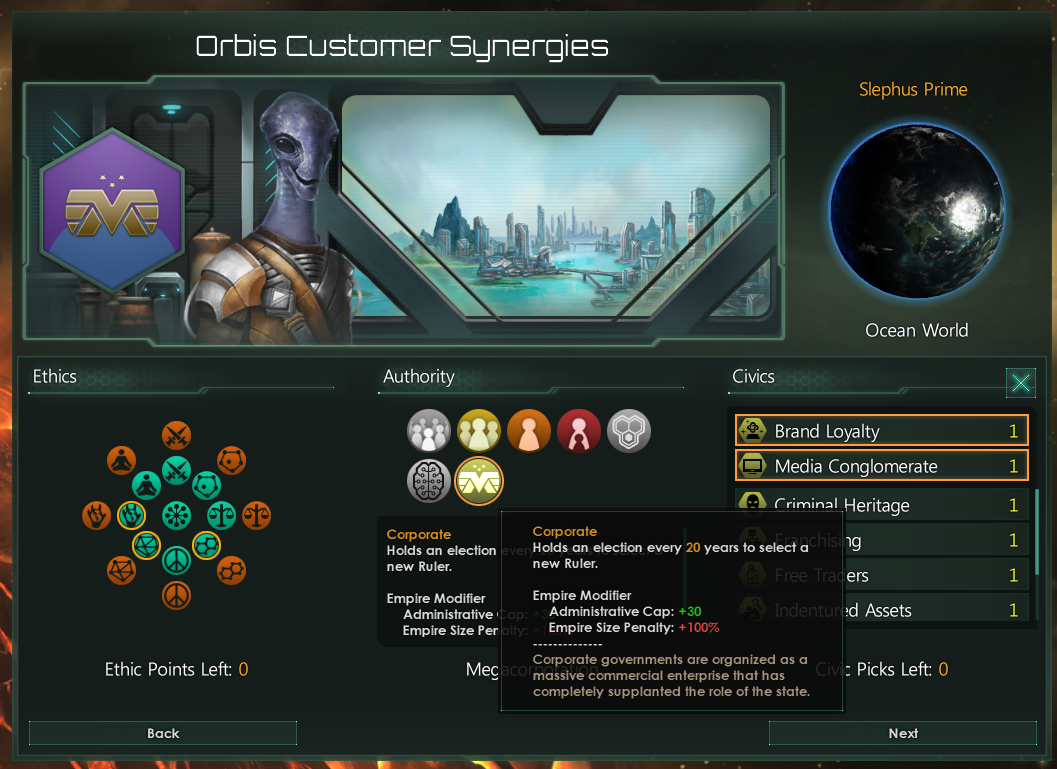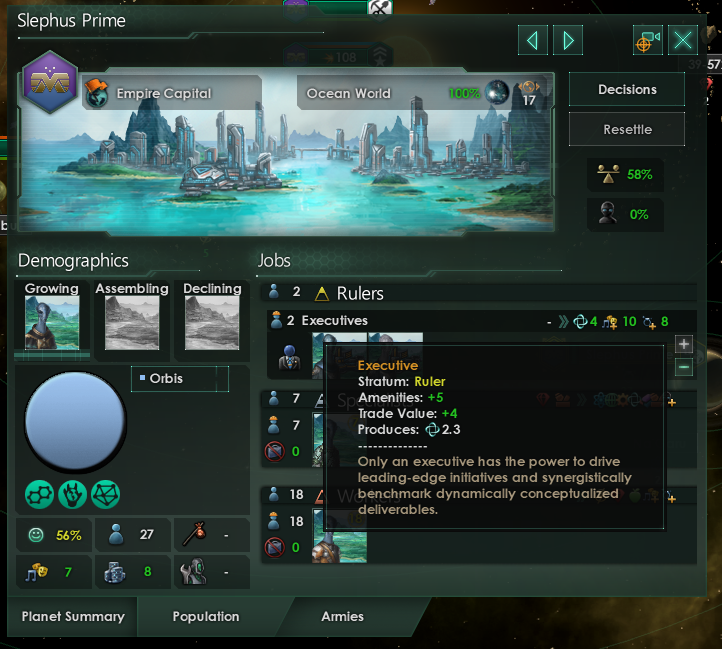Hello everyone and welcome to another Stellaris development diary. Today marks the first dev diary about MegaCorp, the major expansion accompanying the 2.2 'Le Guin update', and the topic is the titular feature of MegaCorp: MegaCorporations. As said before, screenshots will contain placeholder art, prototype interfaces and non-final numbers.
MegaCorporations
A MegaCorporation is a type of empire that uses the new 'Corporate' authority added in MegaCorp. It is an interstellar empire that is structured like a business, and is focused on trade, building tall and generating large amounts of Energy Credits. Unlike the other two new authorities added in Utopia and Synthetic Dawn, the Corporate authority does not have a special ethic, but rather can support any combination of the regular empire ethics - you can play your MegaCorp as an authoritarian spiritualist corporation with indentured workers, or an egalitarian co-op that looks after the welfare of its citizens. Regardless of your ethics though, the Corporate authority has the Oligarchic election format, with a new leader elected every 20 years from a pre-selected pool of candidates.

The Corporate authority comes with its own special set of civics and a number of advantages and drawbacks. MegaCorps get a higher administrative cap (how large your empire can grow without suffering penalties such as tech and unity cost increases), but take double the penalty that normal empires do from being above said cap. This means that MegaCorps are ill-suited to controlling large swathes of space directly, and should focus on claiming fewer, better quality systems and planets. MegaCorps also have special variants of the Administrator and Culture Worker jobs called 'Executive' and 'Manager' respectively, that both produce trade value in addition to their other effects.


The Corporate authority fully replaces the old 'Corporate Dominion' civic for those who have the MegaCorp expansion, but Corporate Dominion is still available as a civic pick if you do not have MegaCorp.
Branch Offices
To compensate for their deficiencies when it comes to controlling territory directly, MegaCorps have the ability to construct Branch Offices on the planets of other empires. A Branch Office is a separate part of the planet screen that is managed by the controlling MegaCorp, where said MegaCorp can construct special Corporate Buildings. Branch Offices can normally only be established on the planets of regular (non-Gestalt, non-Corporate) empires that the MegaCorp has signed a Commercial Pact with. Commercial Pacts are trade agreements signed between two non-Gestalt empires that allow each empire to gain income relative to the size of the other empires' collected trade value, and is a part of the free Le Guin update. For MegaCorps, however, they additionally open for the MegaCorp to establish Branch Offices by paying a fixed sum of Energy Credits.

Branch Offices generate income for the owning MegaCorp based on the amount of trade value present on the planet, and so are best constructed on planets with a large number of Pops. Additionally, for every 25 pops on the planet the MegaCorp can build one Corporate Building, up to a maximum of four. Corporate Buildings are typically mutually beneficial, providing the Corp with some sort of modifier (such as Naval Capacity) or production of a resource (such as Alloys), and giving the planet owner some sort of modifier (such as Amenities) or an increased number of jobs. Many Corporate Buildings also incrase trade value, which benefits both the owner of the planet and the MegaCorp. As a general rule however, the MegaCorp will always benefit more than the owner of the planet. Branch Offices add a small amount of empire size to the MegaCorp, and it will generally not be worthwhile to build them on sparsely populated worlds.

While Branch Offices require a Commercial Pact to be established, cancelling the Commercial Pact does not automatically close them down - once a MegaCorp is established on your planets, it's not that easy to get rid of! Instead, any empire with a planet where a MegaCorp has an 'unlicensed' (no active Commercial Pact) Branch Office will get the 'Expropriation' Casus Belli on the Corp, which if pressed successfully in war shuts down all Branch Offices on that empire's worlds, with the attacker gaining a sum of Energy Credits for each office shut down. However, one should be careful not to declare an Expropriation war they might lose - if the MegaCorp forces surrender on the attacker, the attacker is forced to become a Subsidiary of the MegaCorp (see below for details). It is not possible for a MegaCorp to establish a Branch Office on the planet of an empire they are at war or have an active truce with.

Subsidiaries
Subsidiaries are a special kind of subject available only to MegaCorps, and replacing all the other normal forms of subject (Vassal, Tributary, Protectorate) for them. Subsidiaries have some diplomatic independence, and can expand into new systems and wage war among themselves, but are required to join the MegaCorp in their wars and pay 25% of their energy credit income to their Corporate overlords. Subsidiaries can not be integrated.

In addition to their more straightforward 'regular' civics, MegaCorps also have two gameplay-changing Civics, Criminal Heritage and Gospel of the Masses:
Criminal Heritage
Criminal Heritage has no ethics requirements but cannot be added or removed once the game has begun. It turns the MegaCorp into a criminal syndicate that cannot enter into Commercial Pacts, but does not need the permission of other empires to establish Branch Offices on their planets. The income of their Branch Offices scales to the level of crime on the planet, with a higher level of Crime providing more income, and they have their own set of Corporate Buildings that generally increase crime on the planet in addition to their other effects. Criminal Corporate Buildings are not entirely negative for the owner of the planet, however, especially if that owner has opted to co-exist with criminal elements on the planet. It is also possible to counteract Criminal Syndicates by heavy use of law enforcement, as a low level of crime on the planet will both cut into the income of the Crime Syndicate and makes it possible for an event to fire where law enforcement shuts down the criminal Branch Office on the planet and blocks any further such offices from being built for a time.

Gospel of the Masses
Gospel of the Masses requires spiritualist ethics and can be freely added and removed after the start of the game. It turns the MegaCorp into a MegaChurch that gains a large boost to spiritualist ethics attraction and which gains economic benefits from spiritualist pops on their planets and branch office planets in the form of increased trade, representing tithing and a general cult of consumerism and spending. They can build a special Temple of Prosperity building on their branch office planets which boosts Spiritualist attraction, resulting in more spiritualist pops and economic benefit to both the MegaChurch and the owner of the planet, though an empire that does not wish its pops to start turning Spiritualist may want to consider carefully before allowing the MegaChurches to gain a foothold on their planets... assuming they have a choice in the matter, as Gospel of the Masses can be combined freely with the Criminal Heritage civic.

That's all for today! Next week we're going to continue talking about the MegaCorp expansion, on the topic of Ecumenopolises and new Megastructures.
MegaCorporations
A MegaCorporation is a type of empire that uses the new 'Corporate' authority added in MegaCorp. It is an interstellar empire that is structured like a business, and is focused on trade, building tall and generating large amounts of Energy Credits. Unlike the other two new authorities added in Utopia and Synthetic Dawn, the Corporate authority does not have a special ethic, but rather can support any combination of the regular empire ethics - you can play your MegaCorp as an authoritarian spiritualist corporation with indentured workers, or an egalitarian co-op that looks after the welfare of its citizens. Regardless of your ethics though, the Corporate authority has the Oligarchic election format, with a new leader elected every 20 years from a pre-selected pool of candidates.

The Corporate authority comes with its own special set of civics and a number of advantages and drawbacks. MegaCorps get a higher administrative cap (how large your empire can grow without suffering penalties such as tech and unity cost increases), but take double the penalty that normal empires do from being above said cap. This means that MegaCorps are ill-suited to controlling large swathes of space directly, and should focus on claiming fewer, better quality systems and planets. MegaCorps also have special variants of the Administrator and Culture Worker jobs called 'Executive' and 'Manager' respectively, that both produce trade value in addition to their other effects.


The Corporate authority fully replaces the old 'Corporate Dominion' civic for those who have the MegaCorp expansion, but Corporate Dominion is still available as a civic pick if you do not have MegaCorp.
Branch Offices
To compensate for their deficiencies when it comes to controlling territory directly, MegaCorps have the ability to construct Branch Offices on the planets of other empires. A Branch Office is a separate part of the planet screen that is managed by the controlling MegaCorp, where said MegaCorp can construct special Corporate Buildings. Branch Offices can normally only be established on the planets of regular (non-Gestalt, non-Corporate) empires that the MegaCorp has signed a Commercial Pact with. Commercial Pacts are trade agreements signed between two non-Gestalt empires that allow each empire to gain income relative to the size of the other empires' collected trade value, and is a part of the free Le Guin update. For MegaCorps, however, they additionally open for the MegaCorp to establish Branch Offices by paying a fixed sum of Energy Credits.

Branch Offices generate income for the owning MegaCorp based on the amount of trade value present on the planet, and so are best constructed on planets with a large number of Pops. Additionally, for every 25 pops on the planet the MegaCorp can build one Corporate Building, up to a maximum of four. Corporate Buildings are typically mutually beneficial, providing the Corp with some sort of modifier (such as Naval Capacity) or production of a resource (such as Alloys), and giving the planet owner some sort of modifier (such as Amenities) or an increased number of jobs. Many Corporate Buildings also incrase trade value, which benefits both the owner of the planet and the MegaCorp. As a general rule however, the MegaCorp will always benefit more than the owner of the planet. Branch Offices add a small amount of empire size to the MegaCorp, and it will generally not be worthwhile to build them on sparsely populated worlds.

While Branch Offices require a Commercial Pact to be established, cancelling the Commercial Pact does not automatically close them down - once a MegaCorp is established on your planets, it's not that easy to get rid of! Instead, any empire with a planet where a MegaCorp has an 'unlicensed' (no active Commercial Pact) Branch Office will get the 'Expropriation' Casus Belli on the Corp, which if pressed successfully in war shuts down all Branch Offices on that empire's worlds, with the attacker gaining a sum of Energy Credits for each office shut down. However, one should be careful not to declare an Expropriation war they might lose - if the MegaCorp forces surrender on the attacker, the attacker is forced to become a Subsidiary of the MegaCorp (see below for details). It is not possible for a MegaCorp to establish a Branch Office on the planet of an empire they are at war or have an active truce with.

Subsidiaries
Subsidiaries are a special kind of subject available only to MegaCorps, and replacing all the other normal forms of subject (Vassal, Tributary, Protectorate) for them. Subsidiaries have some diplomatic independence, and can expand into new systems and wage war among themselves, but are required to join the MegaCorp in their wars and pay 25% of their energy credit income to their Corporate overlords. Subsidiaries can not be integrated.

In addition to their more straightforward 'regular' civics, MegaCorps also have two gameplay-changing Civics, Criminal Heritage and Gospel of the Masses:
Criminal Heritage
Criminal Heritage has no ethics requirements but cannot be added or removed once the game has begun. It turns the MegaCorp into a criminal syndicate that cannot enter into Commercial Pacts, but does not need the permission of other empires to establish Branch Offices on their planets. The income of their Branch Offices scales to the level of crime on the planet, with a higher level of Crime providing more income, and they have their own set of Corporate Buildings that generally increase crime on the planet in addition to their other effects. Criminal Corporate Buildings are not entirely negative for the owner of the planet, however, especially if that owner has opted to co-exist with criminal elements on the planet. It is also possible to counteract Criminal Syndicates by heavy use of law enforcement, as a low level of crime on the planet will both cut into the income of the Crime Syndicate and makes it possible for an event to fire where law enforcement shuts down the criminal Branch Office on the planet and blocks any further such offices from being built for a time.

Gospel of the Masses
Gospel of the Masses requires spiritualist ethics and can be freely added and removed after the start of the game. It turns the MegaCorp into a MegaChurch that gains a large boost to spiritualist ethics attraction and which gains economic benefits from spiritualist pops on their planets and branch office planets in the form of increased trade, representing tithing and a general cult of consumerism and spending. They can build a special Temple of Prosperity building on their branch office planets which boosts Spiritualist attraction, resulting in more spiritualist pops and economic benefit to both the MegaChurch and the owner of the planet, though an empire that does not wish its pops to start turning Spiritualist may want to consider carefully before allowing the MegaChurches to gain a foothold on their planets... assuming they have a choice in the matter, as Gospel of the Masses can be combined freely with the Criminal Heritage civic.

That's all for today! Next week we're going to continue talking about the MegaCorp expansion, on the topic of Ecumenopolises and new Megastructures.


